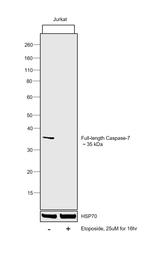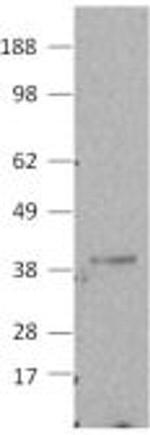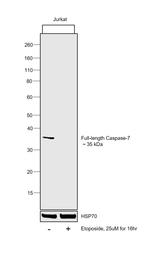Search Thermo Fisher Scientific
Invitrogen
Caspase 7 Monoclonal Antibody (20F3), eBioscience™
This Antibody was verified by Cell treatment to ensure that the antibody binds to the antigen stated.
FIGURE: 1 / 3
Caspase 7 Antibody (14-9933-80) in WB



Product Details
14-9933-80
Species Reactivity
Host/Isotype
Class
Type
Clone
Conjugate
Form
Concentration
Purification
Storage buffer
Contains
Storage conditions
Shipping conditions
RRID
Product Specific Information
Description: The monoclonal antibody 20F3 recognizes human caspase-7, also known as mch3 and ICE-LAP3. It is a member of the cysteine-requiring aspartate protease family, which plays critical roles in cell suicide known as apoptosis. Along with caspases 3 and 7, this member is categorized as an effector or executioner caspase. It must first be activated via cleavage by capase 3, 6, or 8 or by granzyme B. As an effector molecule, caspase-7 is responsible for the demolition phase of apoptosis in that it cleaves PARP and other molecules also cleaved by caspase-3.
This monoclonal antibody can be used to identify both the full-length (p35) and active form (p20) of caspase-7 under reducing conditions by SDS-PAGE.
Applications Reported: This 20F3 antibody has been reported for use in immunoblotting (WB).
Applications Tested: This 20F3 antibody has been tested by immunoblot analysis of reduced Jurkat cell lysates. This can be used at 1-5 µg/mL. It is recommended that the antibody be carefully titrated for optimal performance in the assay of interest.
The presence of a nonspecific band at approximately 58 kDa may be present in some lysates.
Purity: Greater than 90%, as determined by SDS-PAGE.
Aggregation: Less than 10%, as determined by HPLC.
Filtration: 0.2 µm post-manufacturing filtered.
Target Information
Caspase 7 is part of a family of cysteine proteases that can be divided into the apoptotic and inflammatory caspase subfamilies. Unlike the apoptotic caspases, members of the inflammatory subfamily are generally not involved in cell death but are associated with the immune response to microbial pathogens. The apoptotic subfamily can be further divided into initiator caspases, which are activated in response to death signals, and executioner caspases, which are activated by the initiator caspases and are responsible for cleavage of cellular substrates that ultimately lead to cell death. Caspase 7 is an executioner caspase that was identified based on its homology with caspases 1 and 3, as well as the C. elegans cell death protein CED-3. Alternative splicing of Caspase-7 mRNA results in the production of 3 distinct isoforms. Caspase-7 activity can be directly inhibited by XIAP expression. Alternative splicing results in four transcript variants, encoding three distinct isoforms of Caspase 7. Diseases associated with CASP7 include Type 1 Diabetes Mellitus 17 and Aleutian Mink Disease.
For Research Use Only. Not for use in diagnostic procedures. Not for resale without express authorization.
References (0)
Bioinformatics
Protein Aliases: Apoptotic protease Mch-3; CASP-7; caspase 7, apoptosis-related cysteine peptidase; caspase 7, apoptosis-related cysteine protease; Caspase-7; CMH-1; ICE-LAP3; ICE-like apoptotic protease 3; OTTHUMP00000020511; OTTHUMP00000020513; OTTHUMP00000020514; RP11-211N11.6
Gene Aliases: CASP-7; CASP7; CMH-1; ICE-LAP3; LICE2; MCH3
UniProt ID: (Human) P55210
Entrez Gene ID: (Human) 840

Performance Guarantee
If an Invitrogen™ antibody doesn't perform as described on our website or datasheet,we'll replace the product at no cost to you, or provide you with a credit for a future purchase.*
Learn more
We're here to help
Get expert recommendations for common problems or connect directly with an on staff expert for technical assistance related to applications, equipment and general product use.
Contact tech support
